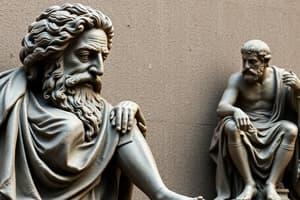Podcast
Questions and Answers
What does Aristotle's Hylomorphism imply about the relationship between the body and the self?
What does Aristotle's Hylomorphism imply about the relationship between the body and the self?
Hylomorphism implies that the body and the soul are inseparable, suggesting that the self cannot exist without physical and spiritual components.
How does Kant differentiate between the inner and outer self?
How does Kant differentiate between the inner and outer self?
Kant's inner self, or transcendental self, encompasses emotions and rational intellect, while the outer self, or empirical self, consists of physical senses and actions.
What role does the ego play in Freud's theory of the psyche?
What role does the ego play in Freud's theory of the psyche?
In Freud's theory, the ego serves as the mediator between the superego, which represents societal norms, and the id, which comprises instinctual drives.
How does Saint Augustine's view of the self relate to his understanding of God?
How does Saint Augustine's view of the self relate to his understanding of God?
What is the significance of Merleau-Ponty's concept of the embodied self?
What is the significance of Merleau-Ponty's concept of the embodied self?
In what way did Aristotle reject Plato’s concept of the self?
In what way did Aristotle reject Plato’s concept of the self?
What does the superego represent in Freud’s model of the psyche?
What does the superego represent in Freud’s model of the psyche?
How does Kant’s concept of the empirical self influence our interaction with the physical world?
How does Kant’s concept of the empirical self influence our interaction with the physical world?
How does Aristotle's Hylomorphism describe the relationship between the body and the soul?
How does Aristotle's Hylomorphism describe the relationship between the body and the soul?
What does Kant's Transcendental Self indicate about personal identity?
What does Kant's Transcendental Self indicate about personal identity?
In Freudian theory, how do the concepts of ego and psyche interact in the development of self?
In Freudian theory, how do the concepts of ego and psyche interact in the development of self?
What is Augustine's view on the concept of the spiritual self?
What is Augustine's view on the concept of the spiritual self?
How does Merleau-Ponty's concept of the embodied self differ from Cartesian dualism?
How does Merleau-Ponty's concept of the embodied self differ from Cartesian dualism?
What role does the 'Looking-Glass Self' play in shaping an individual's self-image?
What role does the 'Looking-Glass Self' play in shaping an individual's self-image?
How does George Herbert Mead's Social Self Theory explain the development of self through social interactions?
How does George Herbert Mead's Social Self Theory explain the development of self through social interactions?
What does Paul Churchland suggest about the nature of the self?
What does Paul Churchland suggest about the nature of the self?
How does Aristotle's Hylomorphism relate to the concept of the self?
How does Aristotle's Hylomorphism relate to the concept of the self?
In what way does Kant's concept of the Transcendental Self differ from other views of self?
In what way does Kant's concept of the Transcendental Self differ from other views of self?
Describe Freud's view of the Ego in relation to the self.
Describe Freud's view of the Ego in relation to the self.
What is Augustine's perspective on the Spiritual Self?
What is Augustine's perspective on the Spiritual Self?
How does Merleau-Ponty's concept of the Embodied Self contribute to our understanding of personal identity?
How does Merleau-Ponty's concept of the Embodied Self contribute to our understanding of personal identity?
What role does memory play in John Locke's theory of the self?
What role does memory play in John Locke's theory of the self?
What is the significance of dualism in both Socrates and Descartes' views on self?
What is the significance of dualism in both Socrates and Descartes' views on self?
How does Hume's view of the self challenge traditional notions of personal identity?
How does Hume's view of the self challenge traditional notions of personal identity?
Flashcards are hidden until you start studying
Study Notes
Philosophers and Their Views on Self
-
Bundle Theory: Proposed by David Hume, suggesting the self is a collection of perceptions, thoughts, and sensations; he dismissed the idea of a fixed self.
-
Aristotle's Perspective: An ancient Greek polymath who emphasized the inseparability of body and soul, constructed his concept of self through hylomorphism—recognizing both physical and psychological components.
-
Immanuel Kant: Highlighted a duality in self with the transcendental self encompassing emotions and rational thought versus the empirical self representing our physical interactions with the world.
-
Sigmund Freud: Developed a model of the psyche consisting of the ego (mediator of consciousness), superego (moral conscience), and ID (instinctual drives). He viewed self as rooted in these parts of the mind.
-
Gilbert Ryle: Criticized Cartesian dualism with the phrase “ghost in the machine,” asserting self is defined by actions rather than an inner hidden self.
-
Maurice Merleau-Ponty: Focused on the physical aspect of self, suggesting that identity is shaped by bodily experiences and interactions with the environment, evolving over time.
-
Paul Churchland: Canadian philosopher who argued that self arises from brain activity rather than existing as a separate entity.
Sociological Perspectives on Self
-
Charles Horton Cooley: Introduced the Looking-Glass Self concept, stating that self-image is shaped by how others perceive us.
-
George Herbert Mead: Proposed the Social Self Theory, which suggests that individual identity develops through social interactions and experiences.
Historical Philosophical Perspectives
-
Socrates: Advocated for self-examination and introspection, stating "Know thyself" and emphasizing the importance of acknowledging one's ignorance for personal growth.
-
Plato: A student of Socrates, believed in the immortality of the soul and that self is defined by its continuity over time, regardless of physical changes.
-
René Descartes: Introduced the concept of dualism with "Cogito, ergo sum," asserting that the mind exists independently and is the source of all actions.
-
John Locke: Proposed the Tabula Rasa theory, stating that self is formed through experiences and memories, making personal identity continuous across time.
-
David Hume: Presented the idea that self is an illusion generated by the mind from a succession of experiences, denying the existence of a permanent self.
Studying That Suits You
Use AI to generate personalized quizzes and flashcards to suit your learning preferences.




